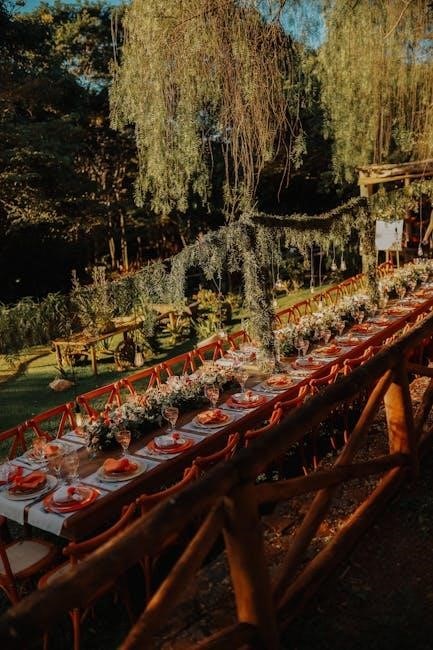A day-of wedding coordinator checklist is a comprehensive guide ensuring a stress-free wedding day by organizing tasks, timelines, and vendor coordination. It helps maintain order and ensures every detail is executed flawlessly, providing peace of mind for the couple. This customizable tool is available as a free PDF, making wedding planning efficient and enjoyable.
Overview of the Checklist’s Purpose
The day-of wedding coordinator checklist serves as a detailed roadmap, ensuring all tasks, timelines, and vendor coordination are managed seamlessly. Its primary purpose is to maintain organization, reduce stress, and guarantee every aspect of the wedding is executed flawlessly. By outlining responsibilities from setup to cleanup, it provides clarity for coordinators, vendors, and the couple. This customizable tool, often available as a free PDF, acts as a comprehensive guide, offering a structured approach to achieving a perfect wedding day experience.
Benefits of Using a Day-of Wedding Coordinator Checklist
Using a day-of wedding coordinator checklist offers numerous benefits, including reduced stress and increased efficiency. It streamlines tasks, ensuring every detail is executed on time and to perfection. The checklist minimizes last-minute issues by providing a clear roadmap for vendors, setup, and timelines. It also allows for customization, catering to specific wedding needs. This tool enhances communication among all parties involved, ensuring a smooth and memorable event. Ultimately, it helps create a seamless wedding experience, giving the couple peace of mind on their special day.

Understanding the Role of a Wedding Coordinator
A wedding coordinator is responsible for organizing, managing vendors, and ensuring timelines are met. They handle logistics, solve problems, and ensure the wedding reflects the couple’s vision, providing a stress-free experience.
Key Responsibilities of a Wedding Coordinator
- Creating and managing detailed wedding timelines to ensure smooth execution.
- Coordinating with vendors, confirming deliveries, and overseeing setups.
- Handling emergencies and resolving last-minute issues discreetly.
- Ensuring all wedding elements align with the couple’s vision and preferences.
- Supervising venue setup, decorations, and layout to meet expectations.
- Communicating with the wedding party, guests, and vendors for seamless coordination.
- Managing the flow of events during the ceremony and reception.
- Ensuring all legal documents, like marriage licenses, are in order.
- Providing final checks to confirm everything is ready before the wedding starts.
Differences Between a Wedding Planner and Coordinator
A wedding planner oversees the entire planning process, from concept to execution, including vendor selection, budget management, and design. They are involved months in advance, handling creative and strategic decisions. A wedding coordinator, however, focuses solely on the logistics of the wedding day, ensuring everything runs smoothly. They typically start a few weeks before the event, managing timelines, vendor deliveries, and setup. While planners are creative and big-picture focused, coordinators excel in execution and problem-solving, ensuring the day unfolds flawlessly without needing to handle long-term planning or budgeting.

Pre-Wedding Coordination Checklist
A pre-wedding checklist ensures all tasks are completed before the big day, including vendor confirmations, timeline finalization, and setup preparations. It helps maintain organization and readiness.
One Month Prior to the Wedding
One month before the wedding, the coordinator should confirm vendor details, finalize the wedding timeline, and ensure all contracts are signed. Review the layout of the venue, plan seating arrangements, and coordinate deliveries. Finalize the wedding party attire, confirm the rehearsal schedule, and prepare an emergency kit. Distribute a detailed timeline to vendors and the wedding party. Begin preparing for setup and teardown logistics. This phase ensures all elements are in place, setting the stage for a smooth wedding day execution.
One Week Before the Wedding
One week prior to the wedding, the coordinator should finalize the wedding timeline, confirm vendor deliveries, and ensure all setup details are clear. Conduct a final walkthrough of the venue, confirm seating arrangements, and prepare place cards. Reconfirm the rehearsal schedule and rehearsal dinner plans. Ensure all wedding attire is ready, accessories are packed, and the wedding party knows their responsibilities. Review the weather forecast and prepare a backup plan if needed. Distribute the final timeline to vendors and the wedding party, and prepare an emergency kit with essentials.
The Day Before the Wedding

The day before the wedding focuses on final preparations to ensure everything is ready for the big day. Set up decorations, arrange seating, and confirm vendor deliveries. Conduct the rehearsal to practice the ceremony flow and make any necessary adjustments. Pack an essentials kit with items like tissues, safety pins, and medications. Confirm the layout of the venue, ensure all signs and stationery are in place, and review the timeline with the wedding party. Finalize the setup of tables, linens, and centerpieces, and ensure all equipment is tested and functional.
Wedding Day Coordination Tasks
Wedding day coordination tasks involve overseeing setup, managing timelines, and ensuring seamless execution of ceremonies, receptions, and vendor deliveries. A checklist guarantees all details are covered, minimizing stress and ensuring a memorable day.
Morning and Setup Tasks
Morning and setup tasks are crucial for a smooth wedding day. Confirm vendor deliveries, arrange decorations, and ensure the venue is ready. Verify the wedding party is prepared, with attire and accessories in place. Set up seating, signage, and essentials like the guest book or cards. Coordinate with the catering team for meal setup and timing. Ensure all materials, including the marriage license and rings, are accessible. A detailed checklist guarantees every detail is accounted for, providing a stress-free start to the celebration. Proper setup sets the tone for an unforgettable day.
Ceremony Coordination
Ceremony coordination involves managing the flow of events, ensuring all elements are in place. Confirm the ceremony timeline with vendors and participants, including the officiant, musicians, and wedding party. Arrange seating for guests, reserved seats, and special requests. Ensure the marriage license, rings, and vows are accessible. Coordinate the procession and recession, and verify all audio-visual equipment is functional. Handle any last-minute adjustments to maintain a seamless and memorable ceremony experience for the couple and their guests. Attention to detail ensures a perfect start to the celebration.
Managing Vendors and Timelines
Effectively managing vendors and timelines is crucial for a smooth wedding day. Confirm vendor arrival times, setup requirements, and delivery schedules. Create a detailed timeline outlining key events and share it with all parties. Oversee vendor setup, ensuring everything aligns with the planned schedule. Monitor progress throughout the day, addressing any delays or issues promptly. Maintain open communication with vendors to ensure seamless execution of the wedding plan. A well-organized timeline and vendor coordination are essential for meeting deadlines and delivering a flawless experience. Utilize a checklist to track vendor tasks and stay on schedule.
Reception and Evening Events
The reception and evening events require meticulous coordination to ensure a seamless transition from the ceremony. Oversee the setup of tables, decorations, and catering, ensuring everything aligns with the couple’s vision. Manage the timeline for speeches, toasts, and special dances, keeping the celebration on track. Coordinate with the DJ or band to maintain the flow of music and activities. Address any last-minute adjustments and ensure the cake cutting, bouquet toss, and farewell events are perfectly executed. A detailed checklist helps track these tasks, ensuring a memorable and stress-free conclusion to the wedding day.

Post-Wedding Coordination Tasks
Post-wedding tasks include overseeing cleanup, vendor breakdown, and ensuring all items are secured. Final payments, gratuities, and handling gifts are also managed, with thank-you notes prepared.
Wrap-Up and Cleanup
The wrap-up and cleanup phase ensures a smooth conclusion to the wedding. Tasks include overseeing venue cleanup, managing vendor breakdown, and securing personal items. Coordinators handle final checks to ensure nothing is left behind, coordinate the distribution of gifts and favors, and confirm all decorations are removed. Proper cleanup and organization are essential for a stress-free end to the celebration, allowing the couple to focus on their new beginning.
Vendor and Supplier Coordination
Effective vendor and supplier coordination is crucial for a seamless wedding execution. Confirm vendor deliveries, setup times, and ensure all details align with the wedding timeline. Assign a point person for vendor communication to address any last-minute issues. Distribute vendor contact lists and confirm they have all necessary information, such as layouts and schedules. Ensure vendors understands their responsibilities and deadlines. This proactive approach prevents delays, ensures smooth setup, and guarantees that all services are delivered as planned, maintaining a stress-free wedding day.
Final Payments and Gratuities
Organizing final payments and gratuities is a critical task for a wedding coordinator. Ensure all vendor payments are prepared in labeled envelopes and distributed as agreed. Include gratuities for exceptional service in separate, sealed envelopes. Verify that all invoices are finalized and payments match contracts. Keep extra cash on hand for unexpected expenses or additional tips. Assign a trusted person to handle payments discreetly during the event. This ensures a smooth and stress-free experience, allowing the couple to focus on celebrating their special day without financial worries.
Downloadable Wedding Coordinator Checklist Resources
Discover downloadable wedding coordinator checklist resources, including free PDF templates and customizable tools, to streamline your wedding planning and ensure a seamless execution.
Free PDF Templates Available Online
Free PDF templates for wedding coordinator checklists are widely available online, offering a convenient and cost-effective solution for couples and coordinators. These templates are designed to be customizable, allowing users to tailor them to their specific needs. They typically include sections for task lists, timelines, vendor details, and emergency contacts. Downloadable in PDF format, these templates ensure that all aspects of the wedding are organized and easily accessible. They are a valuable resource for maintaining order and reducing stress on the big day. Many websites offer these templates for free, making them an excellent starting point for wedding planning.
Customizable Wedding Coordinator Checklists
Customizable wedding coordinator checklists are ideal for tailoring to specific wedding needs. These templates allow users to edit sections, ensuring all details align with the couple’s vision. Available in formats like Word, Excel, and Google Docs, they provide flexibility for adjustments. From vendor management to timeline coordination, these checklists ensure every aspect is covered. They also include space for notes and priorities, making them adaptable to unique requirements. This customization ensures a seamless and organized wedding planning process, catering to individual preferences and scenarios.
Best Practices for Using a Wedding Coordinator Checklist

Stay organized by reviewing and updating the checklist regularly. Ensure clear task assignments and maintain open communication with vendors and the wedding party. Regular updates and real-time tracking will help manage unexpected changes smoothly, ensuring a seamless wedding day experience;
Staying Organized and Efficient
A wedding coordinator checklist serves as a roadmap for ensuring every task is completed efficiently. Prioritize duties, allocate responsibilities clearly, and review the checklist regularly to adapt to changes. Use digital tools or printable templates to track progress in real time, ensuring seamless communication with vendors and the wedding party. Regular updates and a structured approach will minimize stress and keep the wedding planning process on track, allowing for a smooth and enjoyable experience.
Ensuring a Smooth Wedding Day Experience
A day-of wedding coordinator checklist is essential for maintaining order and ensuring every detail is flawlessly executed. By organizing tasks, managing vendor arrivals, and adhering to timelines, the checklist minimizes stress and prevents overlooked details. It also serves as a guide for troubleshooting unexpected issues, allowing the coordinator to address problems efficiently. With a structured plan in place, the wedding day unfolds seamlessly, ensuring the couple and their guests enjoy a memorable and stress-free celebration from ceremony to reception.